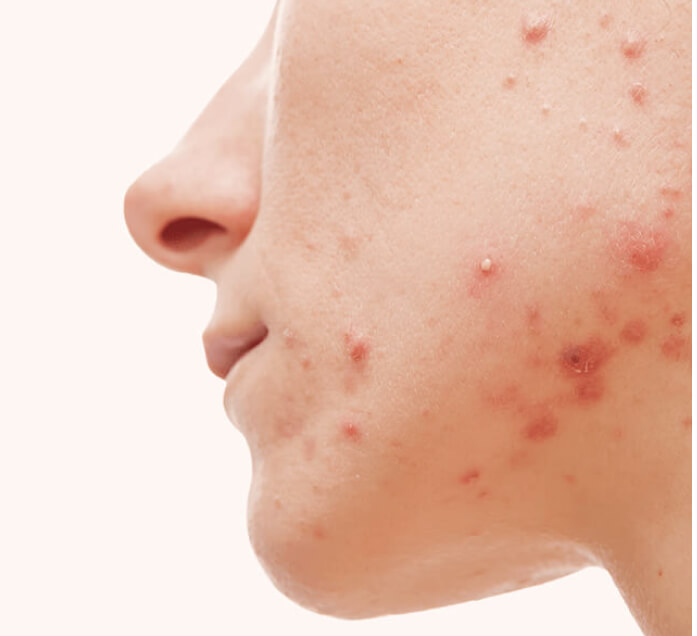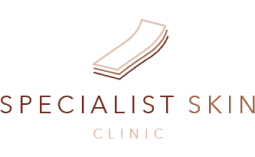Acne & Acne Scars

What Are Acne and Acne Scars?
Acne is a common condition arising from the inflammation of the skin’s oil glands. It can present as whiteheads, blackheads, red bumps, or pus-filled lumps. Although it most commonly occurs on the face, it can also appear on the back, chest, shoulders, and neck.
As a common skin concern, acne can affect most people at some point, usually during their teenage years. However, contrary to popular belief, acne is not confined to teenagers only. While most people outgrow acne by their late teens, some continue to be affected well into adulthood.
In some cases, acne can also cause scarring and leave dark marks. Aside from discolouration (which can vary in intensity), acne scars can sometimes even change the texture of the skin, resulting in pitting or protrusions on the skin.
How Serious Is Acne?

Acne eruptions do come and go, but unfortunately, some are left with acne scars and marks that may be permanent if left untreated.
And it is impossible to predict which patient will scar. Therefore, this condition is not a trivial matter and should be treated early and thoroughly.
Why Am I Getting Acne?
Hormonal Changes
Clogged Pores
Bacterial Growth
Genetic Predisposition
External Factors
Is There Anything I Can Do About My Acne?
Yes! You can clear acne and prevent acne scar formation! However, there is no single one-size-fits-all treatment formula. Our Acne Treatment Programme is specially designed to treat your skin problem and is tailored accordingly to your needs.
Nowadays we have a wide range of acne and acne scar treatments. To achieve the best results, you are advised to go through the whole programme with your
What Causes Acne Scarring?
Acne damages the skin's tissue and the top layer of the skin. This causes the skin to try and repair itself by producing collagen, which helps to replace the tissue that has been damaged. However, too much or too little collagen production can lead to acne scarring.
With inadequate collagen, the skin will not develop enough tissue to repair the damage, leading to skin depressions called atrophic scars. On the other hand, excessive collagen production may lead to raised scars, also known as hypertrophic scars.
Genetics
Picking or popping acne
Sun exposure
Puberty
Delaying or not treating inflammatory acne


What Are the Types of Acne Scars?
Atrophic scars
These are depressions in the skin caused by not having enough collagen while healing. This type of acne scar is divided into three subtypes:
Ice pick scars
- The most common type of atrophic scars, these scars are small but create deep holes in the skin, sometimes resembling a “V” shape.Boxcar scars
- These scars are round or oval-shaped with sharp edges and look like chicken pox scars.Rolling scars
- These scars are very shallow with soft, smooth edges. They create wide depressions in the skin with a rolling or uneven appearance, like an “M” pattern.
Hypertrophic and keloid scars
How Can I Get Rid of Acne Scars?
While acne scars do not affect one’s physical health, they can have a negative impact on one’s confidence. Fortunately, there are effective treatments available to make acne scars appear lighter and more even in texture.
The treatment for acne scars depends on the type of scarring and its severity. Some well-established treatments include laser treatments and
Our Acne and Acne Scar Treatment Programme
Clearance
Control
Correction
- Red marks can be treated with
IPL (intense pulsed light) . IPL works by constricting the tiny congested blood vessels and therefore clears up the red marks, flush and blush of acne. - Brown marks can be treated with lightening creams,
SilkPeel® dermalinfusion microdermabrasion or IPL in resistant cases. - Raised lumpy scars (keloids) benefit from injections of cortisone to soften and flatten them.
- Deep depressed scars and ice-pick scars may benefit from minor surgical procedures like subcision and punch excision.
- Superficial depressed scars can be smoothened out with MiXto fractional CO2 laser treatment and/or skin filler injections.
- Superficial uneven scars can be softened with microdermabrasion treatment.
What Else Do I Need to Know About Managing Acne?
- Do not squeeze or scratch pimples. Avoid facials, scrubs, masks and exfoliants when your acne is inflamed.
- Do not wash with harsh soaps. Wash away the surface oil with a good gentle soap.
- Have a well-balanced diet.
- Use reliable water-based, oil-free cosmetics.
- Stick close to your doctor’s prescription. Feel free to check with your doctor if you have any doubts about the treatment or side effects or for some reason, your condition is not improving.
- Certain birth control pills and hormone medications can worsen your skin condition. Do discuss this with your
skin doctor . - Stress and lack of sleep may aggravate acne.
In Summary
Consult your doctor if treatments are not working or you are uncomfortable with prescribed medications, discuss alternatives with your doctor.
Sometimes, your acne may worsen initially before it gets better and it may take a few months to see definite results. Exercise patience – you will be pleasantly surprised how much you can improve.
FAQs on Acne & Acne Scars
At what age does one get acne?
Acne can happen at any age but it usually begins in puberty due to the increased production of hormones called androgens, which stimulate the oil glands and lead to excess oil production.
Can I still wear makeup if I have acne?
Yes, you can. We recommend that you use oil-free, non-comedogenic makeup to minimise clogging the pores. Most importantly, be sure to wash off your makeup cleanly at the end of each day.
Is applying toothpaste effective in eliminating acne?
No. In fact, toothpaste may cause more harm than good as it contains ingredients that are not suitable for the face and can further irritate the skin.
How long does it take for acne scars to fade?
Mild to moderate acne scars usually start to fade within a few weeks following treatment, such as laser treatment. However, in cases of severe acne scars, it may take a few months.
Can acne scars be prevented?
While acne scars cannot be completely prevented, the following can reduce its severity:
- Refrain from popping your pimples
- Protect your skin from sun damage using sunscreen
- Keep your skin moisturised
- Reduce inflammation using appropriate topical spot treatments
- See a dermatologist to manage acne problems early
Do "heaty" foods cause acne?
There is no conclusive evidence that foods cause or worsen acne. However, the consumption of chocolates and the use of whey protein supplements (found in certain protein supplements used by gym-goers) may cause more acne breakouts or worsen acne as shown in some scientific studies.
Can stress cause acne?
Although stress does not directly cause acne, it can cause hormonal changes that slow the healing of existing acne, or even cause it to worsen.
Can acne scars go away on their own?
Generally, acne scars do not resolve on their own and dermatological treatment is necessary to effectively lighten the scars and smoothen the skin’s texture.
Can poor hygiene cause acne?
No, poor hygiene does not cause acne. In fact, washing your face too frequently or aggressively can irritate and dry out the skin, thereby worsening acne. Instead, use mild cleansers twice a day to cleanse your face gently, and seek professional help from a dermatologist to properly address your acne problems.

| Main Line | : (65) 6734 1411 |
| Fax | : (65) 6235 5900 |
| Mon - Fri | : 8:30am - 5:00pm |
| Sat | : 8:00am - 1:00pm |
| Closed on Sundays and Public Holidays | |

